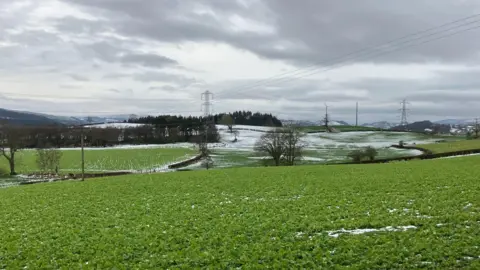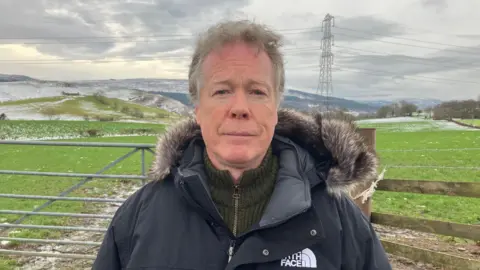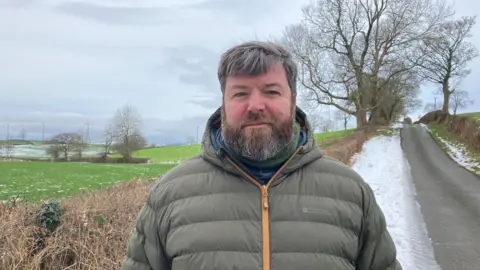Explosion fears over proposed huge battery farm
 BBC
BBCConcerns about fires and explosions have been raised over plans to build one of the UK largest battery farms.
The Ynni Celyn project would create a 1,000MW battery energy storage system (BESS) site on green fields above the village of Gwyddelwern in Denbighshire.
A public meeting will be held on Thursday, with some residents concerned about the safety of the site and potential environmental damage.
Developer NatPower said safety was "paramount" and only about a third of the 75 acre site would house batteries.
BESS are being built across the UK to help balance the electricity grid, which is becoming increasingly powered by renewables.
The systems hold electricity generated from renewable sources such as wind turbines and solar farms.
Plans for the site, close to the Clwydian Hills and a planned new national park, were recently shown to the community.
Dr Kevin Sharp lives near the proposed site and said it could create a "potential catastrophe".
He added said: "We know that these batteries can catch fire, explode and emit lots of very toxic gases.
"I don't think anyone can guarantee the safety of everybody around here, should there be an incident.
"A small chance of a bad thing is an unacceptable risk for the people who live locally."

Demand for electricity is expected to double in Wales by 2050 as efforts to reduce carbon emissions continue and BESS sites are seen as providing a stable and reliable supply.
Similarly sized projects are being built or have been approved.
However, fires and explosions have been reported around the world including one at a 20MW site in Liverpool in 2020.
Jamie Corry also lives close to the site and said it was unsuitable due to the "shocking" access for the fire service.
He added: "There is very little access to water on site and then all the contamination from the water, which is apparently horrendous, would drain off to streams that would eventually go into the River Dee."

NatPower said: "Safety is paramount, with advanced battery technology, fire safety measures developed in collaboration with local fire authorities, and a sustainable drainage system to contain and test water run-off."
It added the site was chosen due to its proximity to a planned National Grid substation and lack of viable brownfield alternatives.
The landowners told BBC Wales they were approached by the developers in the first instance and, as they also live very close by, they would not agree to the development it if they did not feel it was safe.
The UK government said battery fires at storage sites were "extremely rare" and it has "high safety standards" to ensure product safety.
The National Fire Chiefs Council said it encouraged developers to engage early with the fire service in the planning process, but it was not mandatory.
North Wales Fire and Rescue Authority (NWFRS) said it was approached by the company's representatives in November and December.
"We are now in discussions with NatPower," a spokesperson added.
NatPower said its fire consultants had approached NWFRS and hoped to meet them soon.
This story was updated on 20 January 2025 after North Wales Fire and Rescue Service corrected their original statement, where they initially said they had not been contacted by NatPower.
